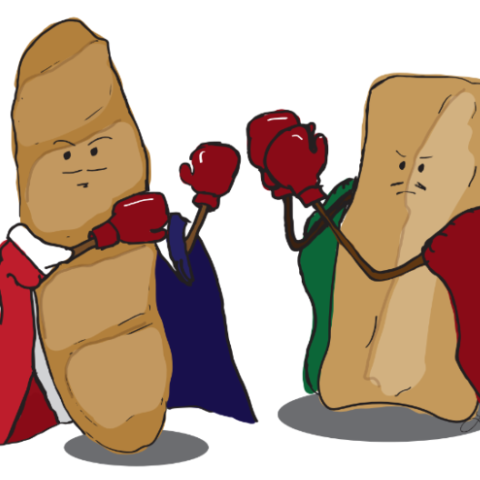
By: Holly Boggs
Scandal is the name of the game when it comes to modern French politics. Between current president and face of the leftist French Socialist Party, François Hollande’s, recent affair making international headlines and former President of the competing right-wing party, Nicolas Sarkozy’s, playboy image problems, it seems hard to decipher which side of the political spectrum the public despises more. This lack of favorable political representatives from the two main parties creates a sort of void that gives other, oftentimes more extreme, parties the chance to fill. Since scandal and lack of public support riddle the typical center-right and center-left parties, de facto support has started being thrown to the third most prominent party, the National Front.
A National Front election victory in the small city of Brignole this past October sent shockwaves through France and set many wary, non-extremist voters on edge. New York Times reporter Alissa Rubin argued that rather than the election being a win for the National Front party, it was “more of a defeat for the two more centrist parties.” Only one-third of registered voters took the time to go to the polls. With many disenchanted center-left and center-right voters opting out of the election, the National Front supporters won by default. The de facto party gaining influence might seem harmless enough, but red flags are sent up around the world when people begin to take a closer look at the National Front party’s history and founding principles.
When people describe the National Front party, the words “racist,” ”Europhobic,” and “anti-Semitic” get tossed around a lot. Though the party has recently begun drawing away from many of its more extreme ideas, its rise to power is resemblant of the scapegoating, ultra-nationalizing traits of other radical, extremist political parties of the past such as Fascism and Nazism.
This party, which runs on platforms such as anti-crime and anti-immigration, oftentimes capitalizes on the fears held by the disconnected, rural poor. The majority of these voters only have contact with foreigners by way of news reports, mentally cementing a one-sided image of non-French citizens that links them with crime and terrorist acts. Add to this a political party that reinforces the notion that foreign immigrants are a threat to the safety and security of the French nation, and a voter-base of biased, racist citizens begins to pool. Former party leaderJean-Marie Le Pen was known for oftentimes drawing attention to the high number of immigrants among prison populations, but his daughter and current head of the party Marine Le Pen links issues such as unemployment and economic hardship to the immigrant population.
While the National Front party has a history of xenophobia and blaming a variety of non-French people for these different societal woes, the burden of blame has concentrated in recent times primarily on Islamic immigrants from the North African countries. The current face of the party Marine Le Pen has carefully distinguished the fact that she is “not against Islam,” but against the “Islamification” of society, which runs counter to French secular principles. This comes after Le Pen’s controversial remarks in December 2010 that likened Islamic prayer in French streets to the German army’s occupation of France during WWII. She has argued that she fights against the infiltration of Sharia law into the French system of ruling.
This “Islamification” that many National Front politicians claim to be fighting against comes across to the French rural as a warning. They interpret it to mean that their country and culture could be taken over by Islamic immigrants if Muslim population size is not contained. The message only encourages suspicion and animosity towards an entire group of people. A former National Front campaign furthers this notion that immigrants are a separate, threatening group by proposing that France “can no longer assimilate new Frenchmen. Ghettos, interracial conflict, sectarian demands and politico-religious provocation are the direct consequences of massive immigration that threatens our identity and carries ever more visible Islamification.”
This closed-minded point of view toward foreigners bred a slogan, “France for the French,” that epitomized the National Front’s ultra-nationalistic and xenophobic stance on political issues. As Jean-Marie Le Pen once put it, “I prefer my daughters to my cousins, my cousins to my neighbors, my neighbors to strangers.” This nationalistic mindset serves as the backbone for many current party platforms. Their support of economic protectionism looks to ensure the dominance of French businesses in their own country by placing heavy taxes on foreign imports. Their aspiration to break with the European Union is due to an unwillingness to play by the rules of nations outside their own. The National Front’s stance on anti-immigration and stronger border patrols strives to bar non-Frenchmen from their country. Behind almost every platform can be found this foundational principle of isolationism and ultra-nationalism.
Though the party suffers historical associations with bigotry, racism, and anti-Semitism, Marine Le Pen has been fighting hard to reshape the image of the party in recent times. She argues the case for her party platforms based on pragmatism, rather than xenophobic sentiment. When supporting her anti-immigration standpoint, she insists that “When I talk about the immigration problem, I don’t talk out of hate, or xenophobia, or Islamophobia, or fear.” She claims to draw her conclusion based on economic pragmatism: “We cannot afford to let everybody in.” Le Pen has also worked hard to cleanse her party of racist candidates from the past. This break with the party’s previous ideology might not be so easily done, however. As Harry Roselmack, a French nightly news anchor, puts it in an op-ed piece for Le Monde Daily, “While it’s false to say that all National Front supporters and officials are racist, it is just as false to say there is no racism in this party: racism and xenophobia are the cement that keeps it together.”
While it might not be brimming with tabloid sagas of illicit affairs, the National Front party is still not exempt from the scandalous, unconventional je ne sais quoi aspect of French politics. As the two main political parties of the country tear themselves apart from the inside, this provocative, extremist party threatens to step in and steal the show.

